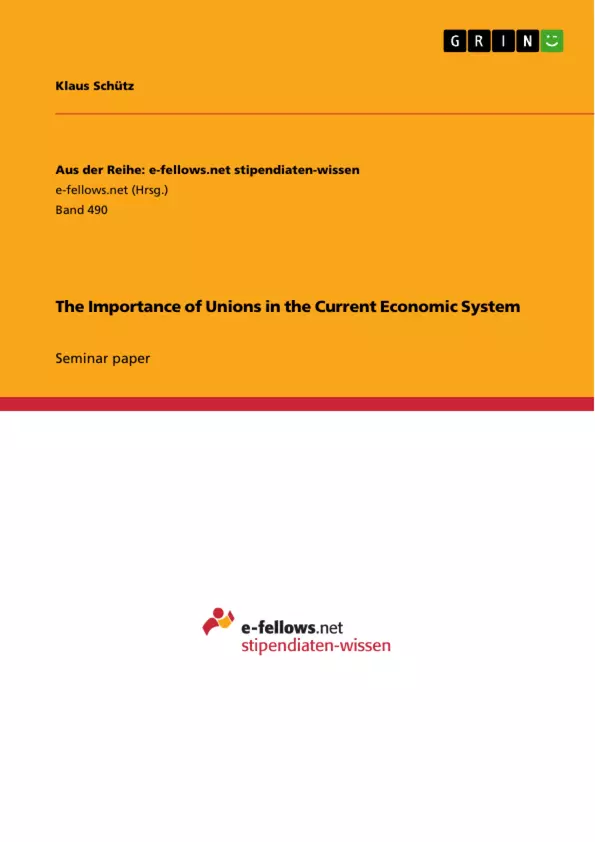The issue of unionization has been very contented in the United States for a long time. Even though it was already discussed controversially in the 19th century, it lost nothing of its actuality, despite all changes in the economic environment. Right now this can be seen in Wisconsin, where a hard-fought debate is going on about the privileges of state workers’ unions. Many people today think that unions had a lot of merits in recent history, but are outdated now and not necessary anymore. In this paper I will show that this opinion shortsighted and why unions are still an important factor in today’s society, especially in the face of the challenges of globalization.
Table of Contents
- Introduction
- History and current situation
- Interests of employees and management
- Interests of employees
- Interests of Management
Objectives and Key Themes
This paper aims to demonstrate the continued importance of unions in the current economic system, specifically in the context of globalization. It argues against the notion that unions are outdated and unnecessary, highlighting their crucial role in protecting employee interests and achieving fair labor practices.
- The historical development of unions in the United States, comparing it to European countries.
- The contrasting interests of employees and management, emphasizing the need for balance and ethical considerations.
- The role of unions in advocating for employee rights, such as fair wages, job security, and safe working conditions.
- The impact of globalization on the labor market and the potential consequences for employees.
- The application of ethical theories, such as Kantian ethics and Utilitarianism, to understand the ethical dimensions of unionization and its impact on stakeholders.
Chapter Summaries
The first chapter introduces the topic of unionization and its historical context, highlighting the ongoing debate surrounding its relevance in contemporary society. It points to the Wisconsin debate as a current example of the conflict between the interests of unions and the broader economic system.
Chapter two provides a historical overview of unionization in the United States, comparing its development with that of European countries. It discusses the evolution of legal protections for unions and their impact on worker rights, including the passage of the National Labor Relations Act and the Taft-Hartley Act. The chapter concludes by examining the decline of union membership in recent decades, attributing it to various factors including the shift towards a knowledge-based economy and negative perceptions of unions.
Chapter three delves into the competing interests of employees and management. It highlights the stockholder approach prevalent in US management practice and its emphasis on profit maximization. The chapter explores the interests of employees, including their desire for fair wages, job security, safe working conditions, and meaningful work. It then examines the perspective of management, focusing on their fiduciary duties to shareholders and the potential conflicts of interest that arise from this relationship.
Keywords
Key terms and concepts explored in this text include unionization, labor movement, employee rights, management practices, globalization, ethical theories, Kantian ethics, Utilitarianism, stakeholder interests, and the stockholder approach.
Frequently Asked Questions
Are unions still relevant in today's globalized economy?
Yes, the paper argues that unions are crucial for protecting employee rights, fair wages, and job security amidst the challenges of globalization.
What is the "stockholder approach" in management?
It is a management practice prevalent in the US that prioritizes profit maximization for shareholders over other stakeholder interests.
How do unions differ between the US and Europe?
The paper compares historical developments, legal protections, and the level of social acceptance of unions in both regions.
Which ethical theories are applied to unionization in this study?
The paper uses Kantian ethics and Utilitarianism to analyze the moral dimensions of labor relations and worker rights.
What was the significance of the National Labor Relations Act?
This act provided essential legal protections for unions in the US, allowing workers to organize and bargain collectively.
- Citation du texte
- Klaus Schütz (Auteur), 2011, The Importance of Unions in the Current Economic System, Munich, GRIN Verlag, https://www.grin.com/document/198661



